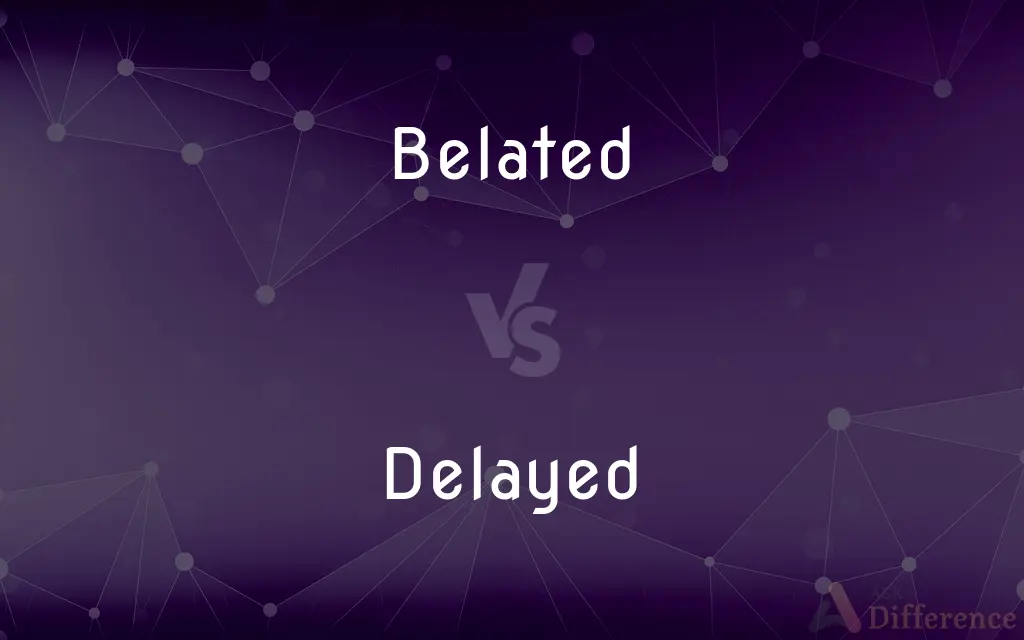Belated vs. Delayed — What's the Difference?
By Maham Liaqat & Urooj Arif — Updated on March 24, 2024
Belated refers to something done or happening later than intended, often acknowledging a missed final line, while delayed signifies a postponement, causing something to happen at a later time than originally planned.

Difference Between Belated and Delayed
Table of Contents
ADVERTISEMENT
Key Differences
Belated typically applies to events or acknowledgments that occur after the expected or customary time, often implying an oversight or apology for the lateness. For example, a belated birthday wish comes after the actual date, recognizing the intended day has passed. Whereas, delayed involves a hold-up or deferment, affecting schedules, transports, projects, and plans, implying that the cause of the postponement may be external or uncontrollable, like a delayed flight due to bad weather.
Belated is often used in a more personal or social context, suggesting a lapse in memory or consideration, such as sending a belated wedding gift. On the other hand, delayed is commonly used in both personal and professional contexts, including logistics and operations, indicating an interruption in the expected timeline, such as a delayed product launch.
The term belated inherently carries a sense of regret or apology for not meeting the customary timing, emphasizing the sender's or actor's acknowledgment of their tardiness. In contrast, delayed focuses more on the impact of the postponement on plans and schedules, without necessarily implying fault or oversight by the person mentioning the delay.
Belated often implies that the event or action, although late, still occurs, maintaining the intent and purpose behind the original timing, albeit after the fact. Delayed, however, suggests a temporary setback, with the expectation that the event or action will occur at a new, later time, still within a relevant timeframe.
Understanding the distinction between belated and delayed is crucial in communication, as it helps clarify the nature of the lateness—whether it's a regretful acknowledgment of something missed or an unavoidable postponement with anticipation of future occurrence.
ADVERTISEMENT
Comparison Chart
Implication
Occurrence after the expected time, with a note of apology
Postponement to a later time, often due to external factors
Context
More personal or social, acknowledging a missed event
Broad, including logistics, transportation, and projects
Connotation
Implies regret or apology for lateness
Focuses on the impact of interruption or hold-up
Usage
Used to refer to events or acknowledgments
Used in reference to schedules, operations, and transports
Expectation
Indicates that the event or action has already taken place, albeit late
Suggests a temporary setback with the event expected to occur later
Compare with Definitions
Belated
Used to acknowledge that something should have occurred earlier.
A belated realization of the truth hit her.
Delayed
Involving a period of waiting.
We experienced a delayed start to the meeting.
Belated
Expressed or done too late.
She offered a belated apology for missing the meeting.
Delayed
Refers to a temporary deferral of an action or event.
The conference call was delayed until all participants could join.
Belated
Relating to something that has been delayed past a relevant period.
He received a belated recognition for his work.
Delayed
Made to occur at a later time than originally scheduled.
The flight was delayed due to bad weather.
Belated
Happening or coming after the expected or usual time.
I sent a belated birthday card.
Delayed
Postponed or held back in terms of progress or development.
The project's launch has been delayed by funding issues.
Belated
Often implies an oversight or mistake.
My belated response was due to misplacing your letter.
Delayed
Can be caused by external factors or conditions.
Delivery of the package was delayed by customs.
Belated
Having been delayed; done or sent too late
A belated birthday card.
Delayed
To postpone until a later time; defer.
Belated
Simple past tense and past participle of belate
Delayed
To cause to be later or slower than expected or desired
Heavy traffic delayed us.
Belated
Later in relation to the proper time something should have happened.
Happy belated birthday!
Delayed
To act or move slowly; put off an action or a decision.
Belated
Lacking education or sophistication.
Delayed
The act of delaying; postponement
Responded without delay.
Belated
Delayed beyond the usual time; too late; overtaken by night; benighted.
Delayed
The condition of being delayed; detainment.
Belated
After the expected or usual time; delayed;
A belated birthday card
I'm late for the plane
The train is late
Tardy children are sent to the principal
Always tardy in making dental appointments
Delayed
The period of time during which one is delayed.
Delayed
The interval of time between two events.
Delayed
Simple past tense and past participle of delay
Delayed
Happening later than is usual, expected, or desired.
Delayed
Caused to be slower or later;
The delayed plane finally arrived
Delayed
Not as far along as normal in development
Common Curiosities
What does it mean when something is described as belated?
It means the thing, often a greeting or acknowledgment, occurred later than expected or customary, usually with an implication of regret.
Can a project be described as belated?
Typically, projects are described as delayed rather than belated, as "belated" suggests an acknowledgment after the fact rather than a shift in timeline.
What causes a delay?
Delays can be caused by a variety of factors, including external conditions, logistical issues, or planning oversights.
How does the concept of fault play into belated vs. delayed?
"Belated" often carries a connotation of personal oversight or fault, while "delayed" usually implies external factors are at play, without direct fault of the person mentioning it.
Can something be both delayed and belated?
In practical terms, an event could be delayed leading to its acknowledgment being belated, but they highlight different aspects of being late.
What is the difference in planning between something that becomes belated vs. delayed?
Planning for a delayed event involves adjusting timelines, while acknowledging something belatedly focuses on recognizing a miss after it occurs.
Can holidays be belated?
Greetings for holidays can be belated, acknowledging the sentiment after the holiday has passed.
What is a common example of something delayed?
Common examples include delayed flights, shipments, or project milestones due to unforeseen circumstances.
Is it acceptable to offer a belated wish?
Offering a belated wish is generally accepted as a thoughtful gesture, recognizing a special occasion even after the fact.
Is a belated event still relevant?
Yes, a belated event or acknowledgment still holds relevance as it maintains the intent behind the original action or greeting, despite being late.
Is an apology necessary for something that is delayed?
An apology may not be necessary for a delay caused by uncontrollable factors, though it is often offered in professional contexts for courtesy.
Can technological issues cause delays?
Yes, technological issues are a common cause of delays in modern contexts, affecting everything from communications to transportation.
How should one communicate a belated acknowledgment?
Communicating a belated acknowledgment should include an expression of regret for the lateness and convey the original sentiment genuinely.
Does a delay always result in a negative outcome?
Not always; some delays can provide additional time for improvement or preparation, leading to a better outcome.
How do people generally react to delays?
Reactions to delays can vary, often depending on the reason for the delay and its impact on plans or expectations.
Share Your Discovery

Previous Comparison
Face vs. Deal
Next Comparison
Disburse vs. DistributeAuthor Spotlight
Written by
Maham LiaqatCo-written by
Urooj ArifUrooj is a skilled content writer at Ask Difference, known for her exceptional ability to simplify complex topics into engaging and informative content. With a passion for research and a flair for clear, concise writing, she consistently delivers articles that resonate with our diverse audience.














































